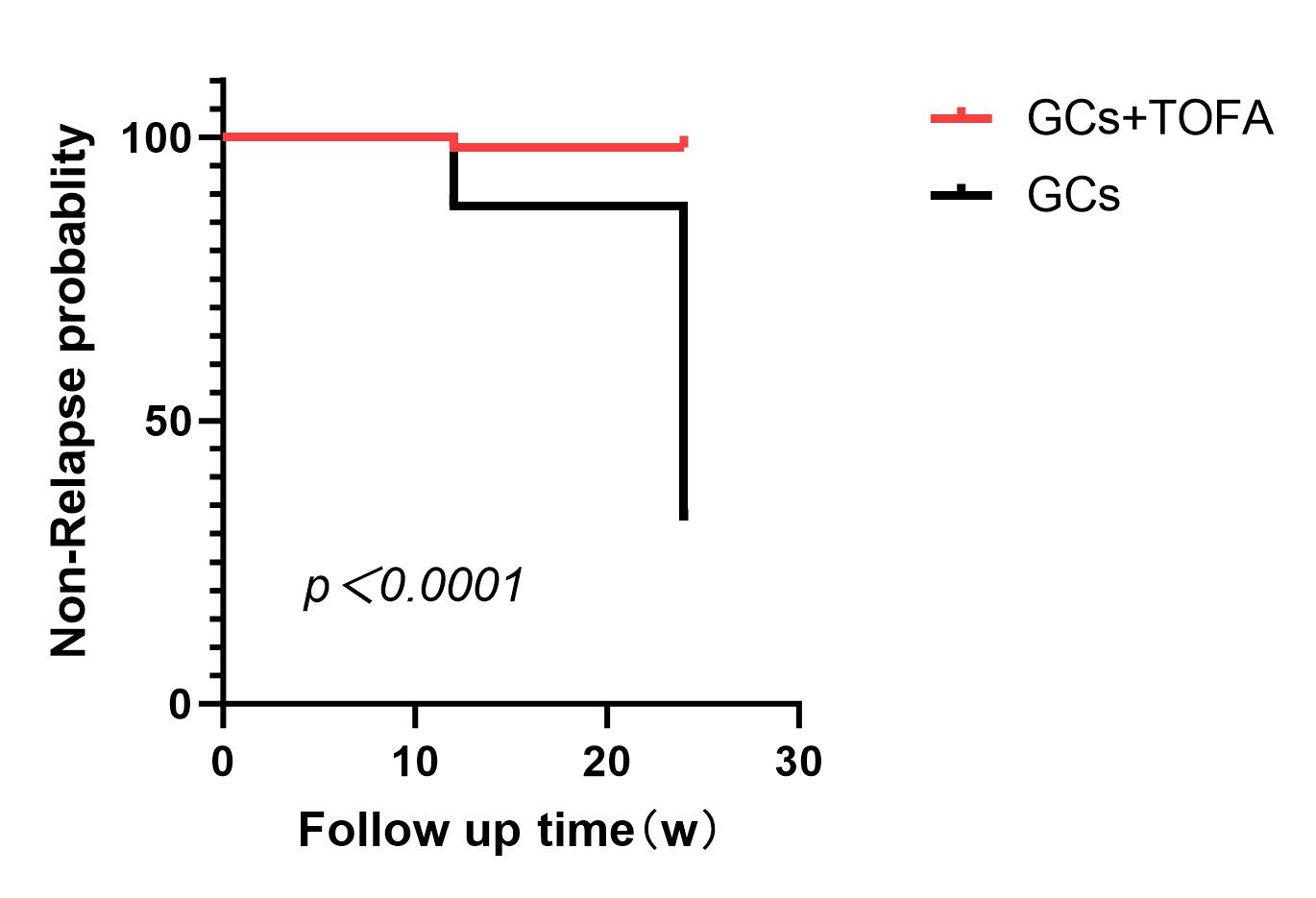Session Information
Session Type: Poster Session
Session Time: 10:30AM-12:30PM
Background/Purpose: To evaluate the efficacy of tofacitinib combined with glucocorticoids (GCs) compared with GCs monotherapy in preventing relapse in patients with IgG4-related disease (IgG4-RD).
Methods: Compared with glucocorticoid monotherapy, the combination of tofacitinib and glucocorticoids significantly reduced the relapse rate in patients with IgG4-RD. Tofacitinib may represent an effective steroid-sparing agent for the treatment of IgG4-RD.
Results: Compared with glucocorticoid monotherapy, the combination of tofacitinib and glucocorticoids significantly reduced the relapse rate in patients with IgG4-RD. Tofacitinib may represent an effective steroid-sparing agent for the treatment of IgG4-RD.
Conclusion: A total of 58 patients were enrolled, with 29 in each group. The baseline characteristics were comparable between the two groups (Table 1). At the time of analysis,26 patients in the combination therapy group and 24 in the monotherapy group had completed follow-up. The relapse rate at week 24 was 0% in the combination therapy group compared with 54.16% (13/24) in the monotherapy group (p < 0.0001) (Fig 2). No significant difference was observed in the change of IgG4-RD RI between the combination group and the monotherapy group (5.64±2.97 vs. 5.17±3.47, p=0.619). The proportion of Th2 cells decreased more significantly in the combination therapy group than in the GCs monotherapy group (-0.71 [-1.41, 0.42] vs. 0.11 [-0.10, 0.69], p=0.032). Changes in IgG4 levels did not differ significantly between the two groups (p=0.389). Four infections occurred in the combination group, (two urinary tract infection, one herpes zoster and one pulmonary infection), but the overall incidence of adverse events did not differ significantly between the groups (p = 0.311). No serious adverse events occurred.
 Table 1. Comparison of baseline characteristics between the combination therapy group an-d the glucocorticoid monotherapy group in patients with IgG4-RD
Table 1. Comparison of baseline characteristics between the combination therapy group an-d the glucocorticoid monotherapy group in patients with IgG4-RD
GCs:glucocorticoids;TOFA:tofacitinib;;IgG4-RD:IgG4 related disease response index
.jpg) Figure 1. Changes in the IgG4-RD RI during the 24-Week follow-up
Figure 1. Changes in the IgG4-RD RI during the 24-Week follow-up
GCs:glucocorticoids;TOFA:tofacitinib;;IgG4-RD:IgG4 related disease response index;****p < 0.0001
.jpg) Figure 2.Kaplan-Meier curves of 24-week non-relapse rates between 2 different treatment groups
Figure 2.Kaplan-Meier curves of 24-week non-relapse rates between 2 different treatment groups
To cite this abstract in AMA style:
Xu X, Zhu H, Ye H. Tofacitinib Plus Glucocorticoids Can Effectively Reduce Relapse Rate in IgG4-Related Disease: A Randomized,Open-label controlled Trial [abstract]. Arthritis Rheumatol. 2025; 77 (suppl 9). https://acrabstracts.org/abstract/tofacitinib-plus-glucocorticoids-can-effectively-reduce-relapse-rate-in-igg4-related-disease-a-randomizedopen-label-controlled-trial/. Accessed .« Back to ACR Convergence 2025
ACR Meeting Abstracts - https://acrabstracts.org/abstract/tofacitinib-plus-glucocorticoids-can-effectively-reduce-relapse-rate-in-igg4-related-disease-a-randomizedopen-label-controlled-trial/
